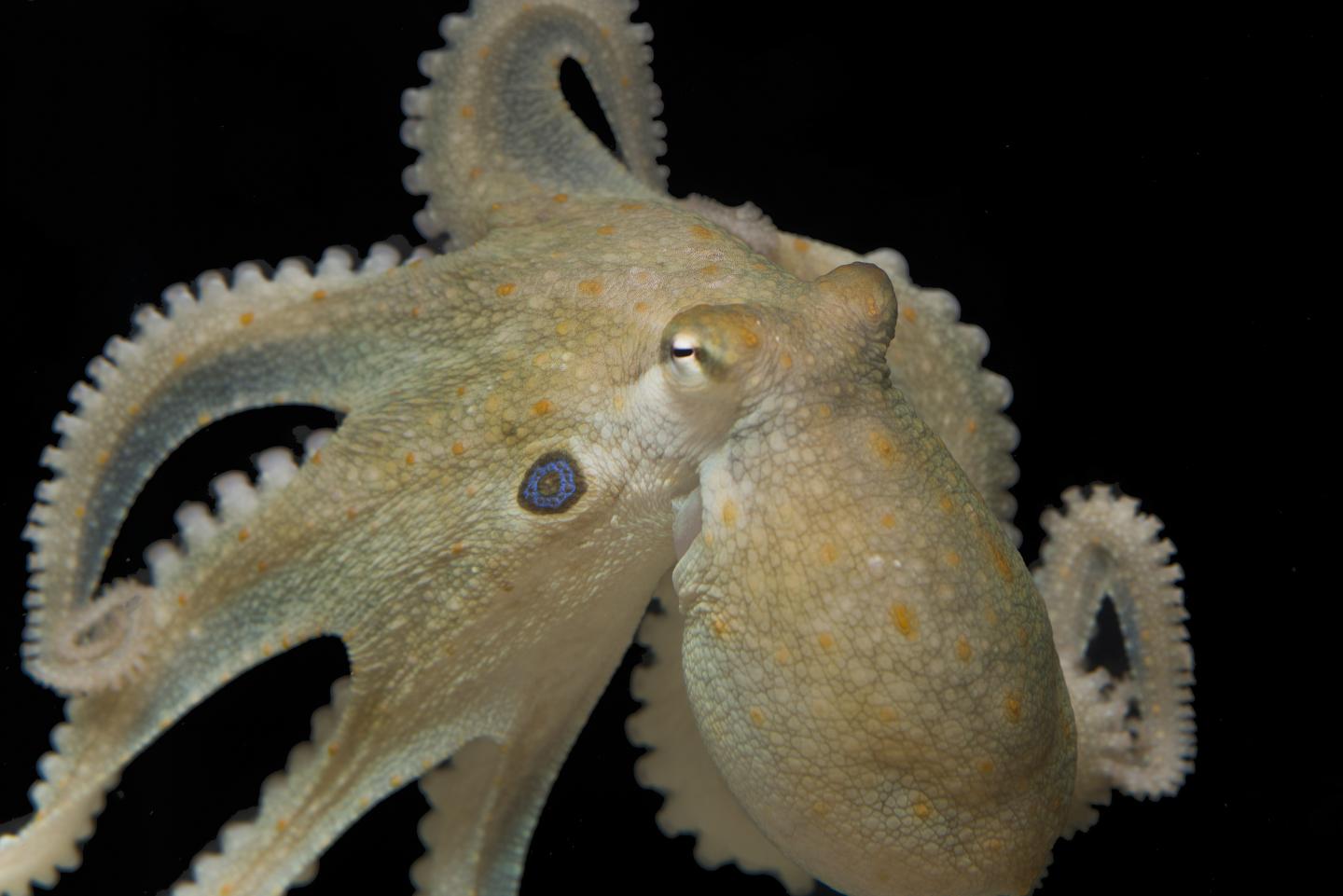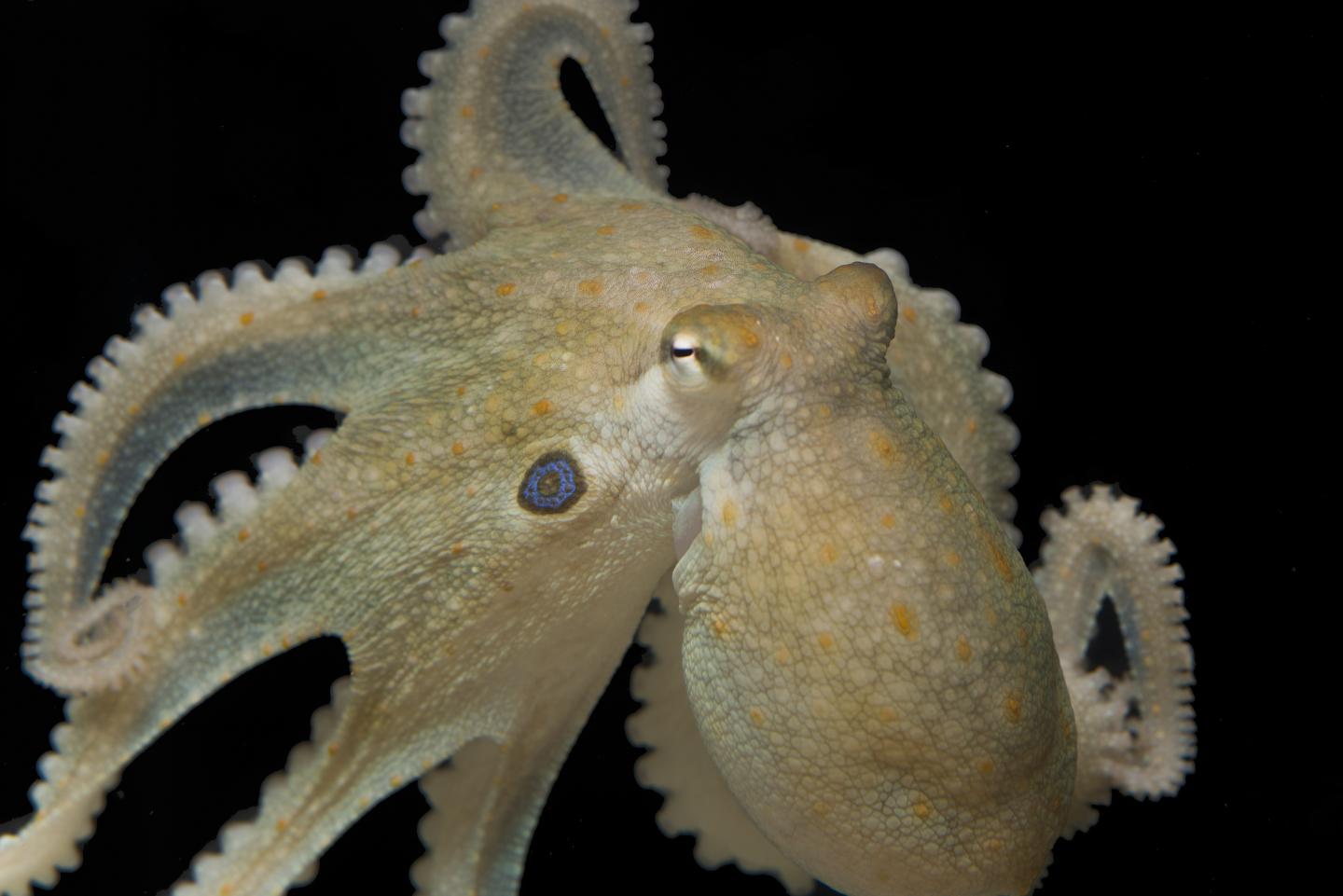
Credit: Tom Kleindinst/Marine Biological Laboratory
WOODS HOLE, Mass.– The mood-altering drug MDMA – which promotes positive, friendly social interactions in humans by inhibiting serotonin uptake in nerve cells – has a similar behavioral effect in an octopus species, scientists report today. This indicates that serotonin has been functioning as a regulator of social behavior for at least 500 million years, when the human and octopus lineages evolutionarily diverged.
The study, conducted by Gül Dölen, assistant professor of neuroscience at Johns Hopkins University School of Medicine and Eric Edsinger, research scientist at the Marine Biological Laboratory, is published this week in Current Biology.
Serotonin is an evolutionarily ancient chemical, with forms of it found across the animal kingdom and even in plants, where it regulates growth. In humans, where it transmits messages between nerve cells, serotonin is a well-known regulator of mood and is closely linked to some types of depression.
Edsinger, who was on the team that sequenced the first octopus genome in 2015 (Octopus bimaculoides) and Dölen took a close look at the genes involved with serotonin uptake in the octopus genome. They found that one important link in this process — a transporter protein that vacuums serotonin up from the synapse (the communication junction between nerve cells), allowing the next round of serotonin release to be received as a discrete signal — has regions that are nearly identical in human and in octopus. Some of these regions are also known to be involved in how the drug MDMA binds to brain cells and alters mood.
"The binding site for MDMA and serotonin in the ion transporter is 100 percent conserved between octopus and human. That is an extraordinary level of conservation. That means, pharmacologically, we could predict MDMA should work in octopus in the way it does in humans. It looks like it did," Edsinger says.
At Johns Hopkins, Dolen designed social behavior experiments with octopuses, testing their interactions with and without the drug. Octopus bimaculoides are known to be predominantly asocial creatures, preferring solitude and under the wrong conditions, killing and eating each other. Administration of MDMA, however, seemed to enhance prosocial behaviors.
"Octopuses aren't 100 percent asocial; they have some tolerance for each other," Edsinger says. "The drug probably amplified a low level of tolerance a bit."
The scientists caution that the results are preliminary and need to be replicated in further experiments. However, discovering that the gene sequence for this serotonin transporter is conserved in human and octopus – meaning their last common ancestor also had it – is significant, Edsinger says.
"If a gene sequence is conserved for 500 million years, it must be very important," he says. "A human is a massively complex system and if you just look within that system, it is hard to know what is relatively important. But if you compare it to the genomes of other animals, you can find the critical elements that evolution just hasn't been able to change over millions of years. From a pharmacological or medical standpoint, these are the elements–such as this serotonin transporter–that may be really important to make sure are functioning correctly."
Octopuses for the experiments were cultured at the Marine Biological Laboratory, which has a growing program to culture and develop cephalopods as genetic model organisms for biological and biomedical research.
###
The Marine Biological Laboratory (MBL) is dedicated to scientific discovery – exploring fundamental biology, understanding marine biodiversity and the environment, and informing the human condition through research and education. Founded in Woods Hole, Massachusetts in 1888, the MBL is a private, nonprofit institution and an affiliate of the University of Chicago.
Media Contact
Diana Kenney
[email protected]
508-685-3525
@mblscience
http://www.mbl.edu
Original Source
http://www.mbl.edu/blog/study-finds-a-conserved-role-for-serotonin-in-regulating-behavior-in-octopus-humans/ http://dx.doi.org/10.1016/j.cub.2018.07.061





